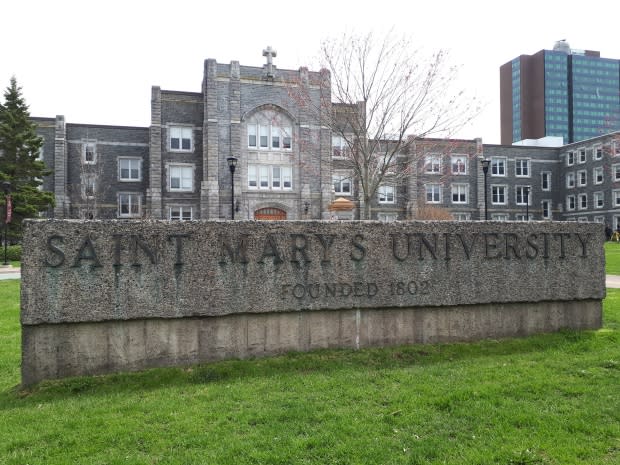After more than $600K in legal costs, SMU athlete's eligibility may never be resolved
One year after an epic legal battle over the eligibility of a university football star played out in courtrooms in Ontario and Nova Scotia, and included a Remembrance Day court sitting, Saint Mary's University has reached a deal on the last bit of outstanding litigation related to the case.
The litigation has been costly for Saint Mary's and other parties, which have seen combined bills of at least $615,000.
For Saint Mary's, it had spent $447,342.51 on legal bills as of early May. University spokesperson Cale Loney declined to provide an updated figure to CBC News and said a freedom-of-information request was needed for that.
The university declined an on-camera interview.
While Saint Mary's is suiting up Saturday in Halifax to play in this year's Atlantic University Sport football championship game against St. Francis Xavier, the university only got to play in the championship game last year after going to court.

The controversy began last fall when the eligibility of wide receiver Archelaus Jack was called into question because of time he spent on the practice roster of the CFL's Saskatchewan Roughriders in 2016.
The dispute centred around the language involving how long former CFL players must wait to become eligible to play at the university level.
Saint Mary's interpreted the one-year wait time as one academic year, not a calendar year.
After more than a half-million dollars in legal fees incurred by four different organizations, whether Jack was eligible may never be known.
Where the legal action started
The legal dispute first played out in Ontario when Saint Mary's said it reached an agreement on Oct. 27, 2017 with U Sports — the governing body for university sports in the country — that there weren't any eligibility issues outstanding.
According to court documents, the agreement came about after Saint Mary's threatened U Sports with court action over the matter. In exchange for the university not pursuing legal action, U Sports agreed not to investigate the eligibility issue.
The university filed court documents with the Ontario Superior Court the week of Nov. 6, 2017, to have the U Sports agreement enforced. The court action was filed in Ontario because that's where U Sports is based.
Atlantic University Sport steps in
Due to concern the Ontario court wouldn't make a decision in time for the Loney Bowl on Nov. 11, Atlantic University Sport, the governing body for university sport in Atlantic Canada, cancelled the game two days before the scheduled kickoff.
Saint Mary's pursued legal action in the Nova Scotia courts to allow the game to proceed. A sitting was held on Remembrance Day, and a judge ruled a day later that the game would be played. The Huskies lost to the Acadia Axemen 45-38 in overtime.
Legal bills were also racked up by three organizations other than Saint Mary's.
AUS has been in litigation with Saint Mary's over whether the conference's decision to cancel the game was appropriate.

Phil Currie, AUS executive director, said both parties have agreed to dismiss the legal action, which means there isn't any clarity surrounding Jack's eligibility.
"No, that hasn't necessarily been decided in reference to the individual last year who was in question," said Currie. "There is also a settlement with U Sports that U Sports wouldn't pursue any further and it just really all comes to an end."
Currie said the move to dismiss the legal action just needs to be approved in court.

He said AUS spent about $44,000 in legal fees in its dispute with Saint Mary's.
With the Axemen one of the teams scheduled to play in last year's title game, Acadia University had legal representation when Saint Mary's went to court on the Remembrance Day weekend to allow the game to proceed.
Acadia University spokesperson Scott Roberts said the university spent $26,254.48 on the Jack case.
He said that as a $100-million operation, Acadia is able to absorb the legal bills, but suggested the money could have been better used.

"It was money that had to be spent at the time given the circumstances ... regardless of the expenditure, if it is not directly related to our core purpose and is unexpected or unplanned, it reduces the budget we have available for other priorities," he wrote in an email.
In an email, Graham Brown, U Sports president and CEO, said it spent "well over" $100,000 on legal fees in the dispute. However, he cautions that figure doesn't tell the full story because U Sports also tapped into a "significant" amount of unpaid legal services.
"The final result is a great deal of time, effort, emotion and cost went into this case," he said.

